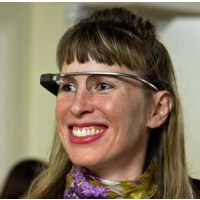Is S.F. Bar’s Ban of Google “Glassholes” a Civil Rights Issue?
 Sarah Slocum (photo: Sarah Slocum)
Sarah Slocum (photo: Sarah Slocum)
Battle lines are being drawn in San Francisco over when it is socially acceptable to don one’s Google Glass—spectacles that provide the wearer with an audio/visual Internet connection and the ability to easily record images surreptitiously.
A couple of weeks after social media consultant Sarah Slocum triggered a brawl by refusing to remove her Glass in Molotov’s, a punkish bar in the Haight, the owner of The Willows, a bar popular with tech folk, banned the $1,500 spectacles from the premises.
Patrons at both bars regarded filming or snapping them as a violation of their privacy, and Slocum blamed it on “some wanker Google Glass haters.” During ensuing dialogue with critics on her Facebook page, Slocum said, “I was not recording anything until one of the girls turned around and flicked me off and started calling me names.”
Punches were thrown and accusations of theft were made by Slocum—and disputed by reputed attendees. Slocum asserted that she had been the victim of a “hate crime.”
Google Glass is a wearable computer device that allows hands-free access to information that is displayed on a lens strapped to the user’s head. It lets users make phone calls, send emails, snap photos and perform tasks as yet unknown using voice-operated commands and hand movements. A skilled wearer can take pictures with the wink of an eye.
A wearer could conceivably wink at a subject and, using face recognition software and access to online databases, immediately stream reams of information about the subject across Glass. The possibilities are endless and, for some, unsettling.
Tensions over Glass have been building since its introduction in 2012. In addition to real-time privacy concerns, there are questions about where all this data streaming through a single source—Google—might eventually end up. Despite assurances that information will remain private to the user, the government has its ways and this is the company that combs through Gmail to sell ads.
Right now, there isn’t much Glass on the street. It is still a bit of an expensive experiment. In San Francisco, where an influx of young tech workers has driven income inequality and changed the face of the city, wearing a computer on yours can engender some degree of hostility.
Some Glass aficionados say once the technology is cheaper and more available, people won’t care who wears it or where. Its rough initial acceptance has been compared to the introduction of Walkman headphones and cellphones, where social conventions clashed with the new behavior.
But even Google knows that Glass is something different. It warns in a memo to Glass Explorers that they shouldn’t be “creepy or rude (aka a ‘Glasshole’)”. It cautions the wearer to be polite and turn Glass off “if you’re asked to turn your cellphone off.” There is no mention of what to do if asked to remove the Glass.
Google’s memo likens Glass to cellphones when describing the socially acceptable Do’s and Don’ts of its presence in public. It can go everywhere but must be restrained at times.
Others would liken it to tobacco, where its assault on the privacy of others is manifest whenever it is on display in public.
All of this is only now beginning to be sorted out as society wrestles with the etiquette and ethics of new technology and once again seeks to redefine “creepy and rude.”
–Ken Broder
To Learn More:
San Francisco Bar Bans "Glassholes" (by Elizabeth Weise, USA Today)
San Francisco Bar Cites Google Glass Attack in Banning Device (by Ari Bloomekatz, Los Angeles Times)
Google Glass Explorer Becomes Last Call Punching Bag at Molotov's (by Kevin Montgomery, Uptown Almanac)
Will Google Glass Be the Next Technology to Breach Our Civil Liberties? (by Joseph Cox, Vice)
- Top Stories
- Controversies
- Where is the Money Going?
- California and the Nation
- Appointments and Resignations
- Unusual News
- Latest News
- California Forbids U.S. Immigration Agents from Pretending to be Police
- California Lawmakers Urged to Strip “Self-Dealing” Tax Board of Its Duties
- Big Oil’s Grip on California
- Santa Cruz Police See Homeland Security Betrayal in Use of Gang Roundup as Cover for Immigration Raid
- Oil Companies Face Deadline to Stop Polluting California Groundwater





